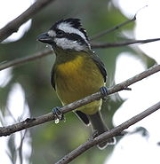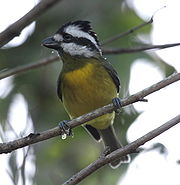
Crested Shrike-tit
Encyclopedia
The Crested Shrike-tit (Falcunculus frontatus) is a bird endemic
to Australia
where it inhabits open eucalypt
forest and woodland.
may require their own family, Falcunculidae (Dickinson 2003). There are three subspecies
(sometimes considered full species
) with disjunct ranges:
on the IUCN Red List
of Threatened Species, the Northern Shrike-tit is considered Endangered, and the Western Shrike-tit is listed as Near Threatened. Both the Northern and Western Shrike-tits suffer from habitat loss and fragmentation.

Endemism in birds
An endemic bird area is a region of the world that contains two or more restricted-range species, while a "secondary area" contains one or more restricted-range species. Both terms were devised by Birdlife International....
to Australia
Australia
Australia , officially the Commonwealth of Australia, is a country in the Southern Hemisphere comprising the mainland of the Australian continent, the island of Tasmania, and numerous smaller islands in the Indian and Pacific Oceans. It is the world's sixth-largest country by total area...
where it inhabits open eucalypt
Eucalypt
Eucalypts are woody plants belonging to three closely related genera:Eucalyptus, Corymbia and Angophora.In 1995 new evidence, largely genetic, indicated that some prominent Eucalyptus species were actually more closely related to Angophora than to the other eucalypts; they were split off into the...
forest and woodland.
Taxonomy and distribution
Recent work with nuclear gene sequencing suggests that the shrike-tits and the Wattled PloughbillWattled Ploughbill
The Wattled Ploughbill, Eulacestoma nigropectus is a small, approximately 14 cm long, olive-brown songbird with a strong, thick, wedge-shaped black bill, used to plough into dead tree branches, bark and twigs in search for its insects diet. The sexes are different. The male has black...
may require their own family, Falcunculidae (Dickinson 2003). There are three subspecies
Subspecies
Subspecies in biological classification, is either a taxonomic rank subordinate to species, ora taxonomic unit in that rank . A subspecies cannot be recognized in isolation: a species will either be recognized as having no subspecies at all or two or more, never just one...
(sometimes considered full species
Species
In biology, a species is one of the basic units of biological classification and a taxonomic rank. A species is often defined as a group of organisms capable of interbreeding and producing fertile offspring. While in many cases this definition is adequate, more precise or differing measures are...
) with disjunct ranges:
- Western Shrike-tit (F. f. leucogaster) - sparsely distributed in south-western Western AustraliaWestern AustraliaWestern Australia is a state of Australia, occupying the entire western third of the Australian continent. It is bounded by the Indian Ocean to the north and west, the Great Australian Bight and Indian Ocean to the south, the Northern Territory to the north-east and South Australia to the south-east...
- Northern Shrike-tit (F. f. whitei) - rare, with isolated records in the Kimberley region of north-western Australia and the Top EndTop EndThe Top End of northern Australia is the second northernmost point on the continent. It covers a rather vaguely-defined area of perhaps 400,000 square kilometres behind the northern coast from the Northern Territory capital of Darwin across to Arnhem Land with the Indian Ocean on the west, the...
of the Northern TerritoryNorthern TerritoryThe Northern Territory is a federal territory of Australia, occupying much of the centre of the mainland continent, as well as the central northern regions... - Eastern Shrike-tit (F. f. frontatus) - the stronghold of the species in south-eastern Australia from the Lower South-East of South AustraliaSouth AustraliaSouth Australia is a state of Australia in the southern central part of the country. It covers some of the most arid parts of the continent; with a total land area of , it is the fourth largest of Australia's six states and two territories.South Australia shares borders with all of the mainland...
, coastally and in the Murray-Darling BasinMurray-Darling BasinThe Murray-Darling basin is a large geographical area in the interior of southeastern Australia, whose name is derived from its two major rivers, the Murray River and the Darling River. It drains one-seventh of the Australian land mass, and is currently by far the most significant agricultural...
to south-eastern QueenslandQueenslandQueensland is a state of Australia, occupying the north-eastern section of the mainland continent. It is bordered by the Northern Territory, South Australia and New South Wales to the west, south-west and south respectively. To the east, Queensland is bordered by the Coral Sea and Pacific Ocean...
, with some scattered occurrences further north and west in Queensland
Description
Males are larger than females in wing length, weight, and bill-size. Males have black throats, while females have olive green.Behaviour
It feeds mainly on insects, spiders and, sometimes, particularly during the breeding season, young birds. Thistles are also taken. It has a parrot-like bill, used for distinctive bark-stripping behaviour, which gains it access to invertebrates.Status and conservation
The Eastern Shrike-tit is evaluated as being of Least ConcernLeast Concern
Least Concern is an IUCN category assigned to extant taxon or lower taxa which have been evaluated but do not qualify for any other category. As such they do not qualify as threatened, Near Threatened, or Conservation Dependent...
on the IUCN Red List
IUCN Red List
The IUCN Red List of Threatened Species , founded in 1963, is the world's most comprehensive inventory of the global conservation status of biological species. The International Union for Conservation of Nature is the world's main authority on the conservation status of species...
of Threatened Species, the Northern Shrike-tit is considered Endangered, and the Western Shrike-tit is listed as Near Threatened. Both the Northern and Western Shrike-tits suffer from habitat loss and fragmentation.

Sources
- Del Hoyo, J.; Elliot, A. & Christie D. (editors). (2007). Handbook of the Birds of the WorldHandbook of the Birds of the WorldThe Handbook of the Birds of the World is a multi-volume series produced by the Spanish publishing house Lynx Edicions. It is the first handbook to cover every known living species of bird. The series is edited by Josep del Hoyo, Andrew Elliott, Jordi Sargatal and David A Christie.So far, 15...
. Volume 12: Picathartes to Tits and Chickadees. Lynx Edicions. ISBN 9788496553422 - Dickinson, E. C. 2003. The Howard & Moore Complete Checklist of the Birds of the World. 3rd Ed. Princeton University Press, Princeton, N.J.
- Schodde, R.Richard SchoddeRichard Schodde, OAM is an Australian botanist and ornithologist.Schodde studied at the University of Adelaide where he received a BSc in 1960 and a PhD in 1970. During the 1960s he was a botanist with the CSIRO Division of Land Research and Regional Survey in Papua New Guinea...
and I. J. Mason.Ian J. MasonIan J. Mason is an Australian ornithologist and taxonomist who is Senior Collection Manager for the Australian National Wildlife Collection. He is an authority on oology.-Publications:...
1999. Directory of Australian Birds. Passerines: i-x, 1-851. CSIRO Publishing, Canberra.

